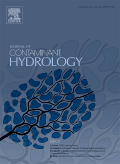
JOURNAL OF CONTAMINANT HYDROLOGY
Scope & Guideline
Innovating solutions for cleaner water resources.
Introduction
Aims and Scopes
- Contaminant Transport Mechanisms:
Research on the physical, chemical, and biological processes that govern the movement of contaminants through soil and water systems, including numerical modeling and experimental studies. - Innovative Remediation Technologies:
Exploration of advanced techniques for the remediation of contaminated water and soil, including bioremediation, nanotechnology, and electrokinetic methods. - Hydrogeochemical Characterization:
Analysis of the chemical and physical properties of groundwater and surface water, assessing the effects of anthropogenic activities and natural processes on water quality. - Impact of Emerging Contaminants:
Investigations into the occurrence, fate, and ecological impacts of new and emerging contaminants, such as microplastics and pharmaceuticals, in aquatic environments. - Data-Driven Approaches and AI in Hydrology:
Application of artificial intelligence and machine learning techniques to improve the prediction and management of contaminant transport and water quality.
Trending and Emerging
- Microplastic Pollution:
An increasing number of studies focus on the prevalence, transport, and remediation of microplastics in various environments, highlighting their growing ecological and human health concerns. - AI and Machine Learning Applications:
There is a notable surge in research utilizing artificial intelligence and machine learning to optimize contaminant detection, prediction, and management strategies, indicating a shift towards data-driven methodologies. - Integrated Approaches to Water Quality Management:
Research emphasizing holistic and integrated frameworks for managing water quality, combining ecological, chemical, and socio-economic factors, is gaining prominence in response to complex environmental challenges. - Advanced Remediation Techniques:
Emerging technologies for remediation, including the use of nanomaterials and bioengineering, are increasingly featured, reflecting a shift towards innovative solutions for environmental cleanup. - Climate Change Impact Studies:
Research examining the effects of climate change on contaminant transport and water resources is rapidly expanding, addressing urgent environmental issues faced globally.
Declining or Waning
- Traditional Contaminant Modeling Techniques:
The reliance on conventional modeling approaches has diminished as more sophisticated data-driven and hybrid models emerge, leading to a decline in publications focused solely on traditional methods. - Longitudinal Studies of Established Contaminants:
Research on well-known contaminants such as heavy metals and PAHs is becoming less frequent as attention shifts towards emerging pollutants and innovative remediation strategies. - Basic Hydrogeological Studies:
Publications that focus primarily on fundamental hydrogeological principles without integrating contemporary contaminant studies are less common, reflecting a trend towards more applied and interdisciplinary research.
Similar Journals
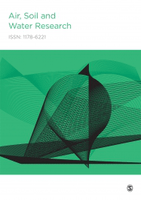
Air Soil and Water Research
Innovative Solutions for Interconnected SystemsAir Soil and Water Research is a premier open access journal published by SAGE Publications Ltd, dedicated to the interdisciplinary study of environmental science. Since its inception in 2008, this journal has provided a vital platform for researchers and professionals to disseminate findings that enhance our understanding of the interconnectedness of air, soil, and water systems. With an impressive impact factor and a ranking of #43 out of 233 in the General Environmental Science category, the journal proudly occupies the Q2 quartile within its field, demonstrating its influence and contribution to environmental research. The journal's editorial board comprises leading scientists and experts committed to ensuring high-quality publications that address important environmental challenges. Accessible to all, it provides a wealth of knowledge and resources for academics, practitioners, and policymakers looking for innovative solutions to pressing ecological issues.
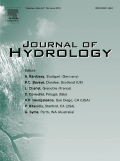
Journal of Hydrology
Elevating Hydrological Insights to New HeightsThe Journal of Hydrology, published by ELSEVIER, stands as a premier outlet for scholarly research in the field of water science and technology. With an impactful history dating back to 1949 and a convergence period extending to 2024, this journal has consistently provided a platform for cutting-edge research that shapes our understanding of hydrological processes and their implications. Located in the Netherlands, its commitment to excellence is underscored by its impressive Scopus rank of 15 out of 261 in the Environmental Science category, placing it in the 94th percentile overall, and achieving a prestigious Q1 category allocation for 2023. While the journal does not currently offer open access options, it remains an invaluable resource for researchers, professionals, and students seeking to deepen their expertise in hydrology. The rigorous peer-review process ensures the publication of high-quality manuscripts that contribute significantly to the advancement of knowledge in this critical domain.
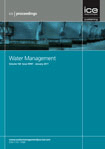
PROCEEDINGS OF THE INSTITUTION OF CIVIL ENGINEERS-WATER MANAGEMENT
Transforming Water Management through Peer-Reviewed InsightsPROCEEDINGS OF THE INSTITUTION OF CIVIL ENGINEERS-WATER MANAGEMENT is a prestigious journal published by Emerald Group Publishing Ltd, dedicated to advancing the field of water management within civil engineering. With an ISSN of 1741-7589 and an E-ISSN of 1751-7729, this journal delivers peer-reviewed research that spans the critical intersections of water science and technology, contributing valuable insights into sustainable water management practices. As evidenced by its ranking in the 2023 Scopus categories, where it holds the Q3 quartile in Water Science and Technology, and a respectable position among its peers, the journal remains a vital resource for researchers, professionals, and students in the field. Though it is not an open-access journal, it offers accessible subscription options that facilitate worldwide dissemination of knowledge, enhancing its role as a fundamental reference point for cutting-edge developments in water management. For those looking to publish or stay updated on the latest research trends, this journal serves as an essential platform for promoting innovation and sustainable practices in civil engineering and water resources management.

GEOLOGICA ACTA
Unveiling the Earth’s secrets through open-access research.GEOLOGICA ACTA is a distinguished open-access journal dedicated to the field of geology, published by Universitat de Barcelona since its inception in 2003. With an impact factor that reflects its relevance in the academic community and a commendable Q2 ranking within the Earth and Planetary Sciences category, this journal is committed to disseminating high-quality research that spans various aspects of geological sciences. The journal's broad scope encompasses both theoretical and applied research, making it a vital platform for researchers, professionals, and students alike to share their findings with a global audience. With its Open Access policy, GEOLOGICA ACTA ensures that all published articles are freely accessible, fostering collaboration and innovation in the geological community. Based in Barcelona, Spain, at the Geociences Barcelona (CSIC), it plays a pivotal role in connecting scholars from diverse backgrounds and advancing the field of geology through rigorous peer-reviewed articles.

Environmental Science-Water Research & Technology
Advancing knowledge in water science and technology.Environmental Science-Water Research & Technology is a premier journal published by the Royal Society of Chemistry that focuses on the latest research and technological advancements in the field of water science and engineering. Since its inception in 2015, the journal has steadily gained recognition for its rigorous peer-review process and commitment to advancing our understanding of fresh, wastewater treatment, and sustainable water management. With a remarkable 2023 impact factor and consistently achieving Q1 status in both Environmental Engineering and Water Science and Technology categories, this journal ranks within the top percentile of its field, underscoring its pivotal role in fostering innovative solutions to global water challenges. Currently listed as Rank #26/261 in Water Science and Technology and Rank #34/197 in Environmental Engineering by Scopus, it provides an essential platform for researchers, professionals, and students alike. The journal embraces a broad spectrum of topics concerning water research, aiming to bridge the gap between scientific understanding and practical application.

LIMNETICA
Exploring the depths of freshwater ecosystems.LIMNETICA is a prestigious academic journal dedicated to advancing the field of Aquatic Science, Ecology, and Water Science and Technology. Published by the Asociación Española de Limnología in Spain, this journal serves as a vital platform for researchers and professionals seeking to share their findings and insights from 1996 to 2024. With a commendable Q2 ranking in Ecology and notable Q3 rankings in Aquatic Science and Water Science and Technology, LIMNETICA emphasizes high-quality, peer-reviewed research that contributes to our understanding of freshwater ecosystems. Although currently not classified under Open Access, its rigorous indexing and Scopus rankings—positioning it in the top 64th percentile for Environmental Science—illustrate its impact in the scientific community. Researchers, students, and professionals are encouraged to engage with LIMNETICA to stay abreast of key developments and foster collaborative efforts in aquatic research.
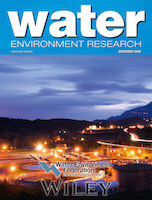
WATER ENVIRONMENT RESEARCH
Transforming knowledge into action for water sustainability.WATER ENVIRONMENT RESEARCH is a leading scholarly journal dedicated to disseminating cutting-edge research in the fields of water science and technology. Published by WILEY, this esteemed journal (ISSN: 1061-4303; E-ISSN: 1554-7531) is renowned for its rigorous peer-reviewed articles that explore critical issues related to ecological modeling, environmental chemistry, pollution, and waste management. Established in 1992 and continuing through 2024, WATER ENVIRONMENT RESEARCH has secured a notable position within its category quartiles, ranking in the Q2 tier for several disciplines, including ecological modeling and water science and technology. It is highly regarded in the Scopus database, holding a rank of #53 out of 261 journals in Environmental Science related to Water Science and Technology, positioning it in the 79th percentile. As it continues to bridge research and practice, this journal serves as an essential resource for researchers, professionals, and students striving to advance knowledge and foster sustainable solutions within the water environment sector.
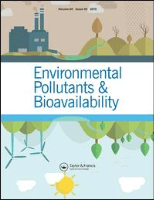
Environmental Pollutants and Bioavailability
Unraveling the Impact of Pollutants on Biological SystemsEnvironmental Pollutants and Bioavailability, published by Taylor & Francis Ltd, serves as a critical platform for disseminating high-quality research focused on the interactions between environmental contaminants and biological systems. Since its inception as an Open Access journal in 2019, it has rapidly gained recognition within the scientific community, achieving a commendable Q2 ranking in multiple categories including Chemical Health and Safety, Health, Toxicology and Mutagenesis, and Toxicology for the year 2023. The journal aims to bridge the gap between environmental science and public health by exploring innovative methodologies, risk assessments, and bioavailability studies related to pollutants. Located in the United Kingdom, Environmental Pollutants and Bioavailability is positioned to impact ongoing discourse and research practices in the fields of toxicology and environmental safety, making it an invaluable resource for researchers, professionals, and students dedicated to advancing knowledge in these critical areas.
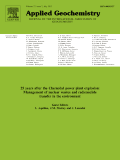
APPLIED GEOCHEMISTRY
Shaping the Future of Environmental Chemistry through GeochemistryApplied Geochemistry is an esteemed peer-reviewed journal published by Pergamon-Elsevier Science Ltd, dedicated to advancing the field of geochemistry by exploring the intricate relationships between geological processes and environmental chemistry. With a significant impact factor and prestigious standing in various categories, including Environmental Chemistry, Geochemistry and Petrology, and Pollution, Applied Geochemistry is classified within the Q2 quartile, reflecting its influence and recognition in the scientific community. The journal spans research contributions from 1986 to the present, focusing on critical issues such as the impact of geochemical processes on the environment, the evaluation of pollution sources, and innovative methodologies in geochemical analysis. Through its rigorous publication standards, Applied Geochemistry serves as a vital resource for researchers, professionals, and students seeking to enrich their understanding of geochemical phenomena and their implications for environmental health. Please note that access to the journal is not open; therefore, institutional or individual subscriptions may be required for full-text viewing.
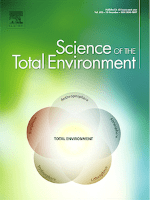
Science of The Total Environment
Innovative Research for Global Environmental ChallengesScience of The Total Environment, an esteemed journal published by Elsevier, holds a significant position in the field of environmental science, encompassing critical areas such as Environmental Chemistry, Environmental Engineering, Pollution, and Waste Management and Disposal. With an impressive impact factor and ranked in the Q1 quartile across its categories for 2023, the journal is recognized for its high-quality research output and contribution to environmental sustainability. Operating from its base in the Netherlands, the journal has been a valuable resource since its inception in 1972, welcoming innovative studies that address complex environmental challenges. Its notable rankings—such as Rank #9 in both Environmental Sciences and Pollution—underscore its relevance and influence in the academic community. Although the journal currently does not provide an open access option, the robust findings and discussions presented within its pages continue to foster a deeper understanding of environmental issues. Science of The Total Environment is an essential platform for researchers, professionals, and students dedicated to advancing knowledge and solutions in the rapidly evolving field of environmental science.